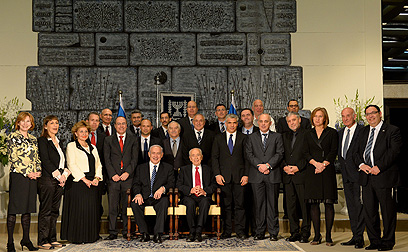
Ministers OK governance bill draft
Law proposal, reportedly drafted at PM's behest, seeks to complicate no confidence votes, raise electoral threshold; critics, including Knesset speaker, cite damage to small parties
The Ministerial Legislation Committee approved the draft version of the "governance bill" submitted by Knesset Member David Rotem of Yisrael Beiteinu. The bill, introducing significant amendments to the Basic Law that defines the structure of government in Israel, will be brought for a vote at the Knesset plenum.
The full title of the proposal, slated for an expedited legislative procedure, is "Increase of Governance and Raising of the Electoral Threshold." According to senior Likud sources, the bill is drafted at the behest of Prime Minister Benjamin Netanyahu.
Related stories:
- New bill aimed to beef up power of gov't
- MKs spar over universal draft
- IDF moves up hesder yeshiva students' draft
The bill is aimed at significantly complicating the passing of no confidence motions in the Knesset plenum, limiting the number of cabinet ministers to 19 and raising the electoral threshold to 4% of the general vote.
Knesset Speaker Yuli Edelstein said he objects to the proposal in its current from, and proposed to amend it significantly so as not to put the principle of democratic representation at peril. "I object in the strongest terms to raising the electoral threshold," he said.
"The discussion is a legitimate one, but putting it in motion would gravely compromise the ideological minorities, will cause alienation among many sectors and hurt the voters' rights."

Members of 33rd cabinet with President Peres (Photo: Avi Ohayon, GPO)
The first clause in Rotem's bill purports to significantly complicate the passing of the motion of no confidence. "The people elected the government so it could rule, and we must enable it to do just that," he explained.
Rotem added that the prime minister and the government should not be subject to "extortion and endless parliamentary shenanigans."
As things stand, every Knesset faction can submit a proposal toward a vote of no confidence, a right various opposition parties choose to exercise on an almost weekly basis. This stands to be revoked in the new law, which will enter effect starting with the next Knesset.
Other clauses aimed toward increasing the power of the government stipulate that in the event a vote of no confidence passes, and the appointed opposition leader fails to assemble a government, the previous government returns to its duties.
Also under the new bill, the president's stamp of approval shall no longer be a precondition for the dismissal of the Knesset.
In addition, the law proposal seeks to limit the number of cabinet ministers to 19 and double the electoral threshold to 4% of the general vote. This controversial motion is seen as targeting the smaller parties - chiefly the Arab ones - which make up a significant proportion of the opposition.
Another clause potentially hurtful to the smaller political blocs is calling off funding for the election campaigns of those parties which failed to pass the electoral threshold. The practical meaning of this is likely to be the obliteration of many fringe parties unable to secure independent funding of their campaigns.
The bill was criticized on the left of the political spectrum, including by Opposition Chairwoman MK Shelly Yachimovich, head of the Labor party, and Meretz Chairwoman Zahava Gal-On, both whose comparatively large parties stand to benefit from the bill.
- Receive Ynetnews updates directly to your desktop










